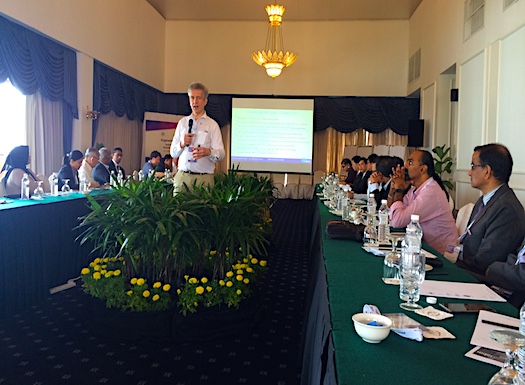A top level summit of equipment manufacturers, trainers and broadcasters is taking place in Kuala Lumpur this weekend to tackle skills shortages in broadcast and media technology.
About 30 high level professionals are attending the Engineering the Future summit, which aims to identify broadcast skills shortages and propose industry solutions for the Asian region.
The summit is organised by the International Association of Broadcast Manufacturers (IABM), in conjunction with the ABU and AIBD.
Opening the summit, Dr Zaki (pictured left) from Media Prima said, “in my twenty year career, the last few years have been the most challenging because of digitisation… that little black box is a big disruptor.”
A university lecturer from Malaysia told the summit: “Across this region, people who do not know broadcasting are teaching broadcasting, this is one of the issues that we have.”
IABM’s Nial Duffy (pictured below) outlined issues that emerged in a similar summit in Geneva last year:
“At first we thought that the problem was the number of retiring engineers causing a ‘skills exit’ of broadcast engineers. But when we tested that assumption, we discovered that actually broadcasters were quite relaxed about this. They were easily able to cover the retirement problem.
“The real problem was at the start of the cycle – attracting the right calibre of candidate, because they are not doing the right courses that lead them to a career in broadcast engineering. The world is moving from hardware to software skills, so we are competing for staff with employers like Google, which are much more attractive to young people than broadcast companies.
“The industry is starting to realise that we have to compete with other industries.”
Another factor identified is that training has not been a priority for broadcasters in the last few years.
There are different priorities for each player in the sector. Broadcasters are not training as much as in the past and have left training to the university sector, but the university sector is more focused on academia than practicality and other courses have higher priority that broadcast engineering courses for universities.
After defining what the problem really is, the IABM has begun taking a number of initiatives to counter this problem. This Asian summit aims to discover if those solutions will work in Asia and identify what other solutions may be needed for the APAC region.
Needs identified so far include access to learning resources, careers portals and keeping training materials up to date.
One piece of good news is that the BBC has a range of online training resources for engineers that were previously geo-locked, but, in consultation with IABM the BBC has unlocked those resoures, which are now available online from the BBC website.
Some of the changes in skills needed identified in the cummit’s discussions are:
Movement from Broadcasting Systems Operations and Minatenance areas, to Hybrid Systems Design and Implementation skill sets. Another new area is DevOps, the merging of software development and operations functions.
For manufacturers, the new skills needed are IT & File Based product development skills and IP based products and services.
One problem identified is the career expectations of graduates, They study for an engineering degree, but when they get a job they start at the bottom in an operator or basic technical role, so after a while they leave for better paying industries with faster advancement and better paying career tracks. On the other hand, those who get into the industry without formal qualifications may not have the theoretical background that is needed for advancement in the technical areas. A rethink of how training is delivered was identified as an important response to these changing training requirements and career expectations.
Other skills identified as needed for broadcast engineers today, as well as the traditional skills, are: cyber security, cloud storage and management, training design and delivery skills, website management and analytics tools, marketing, integrating social media interaction with live and replayed broadcast programs, and understanding of creative skills.

AsiaRadioToday’s Steve Ahern is participating in the Summit in his capacity as a training expert and Managing Director of AMT Pty Ltd.

